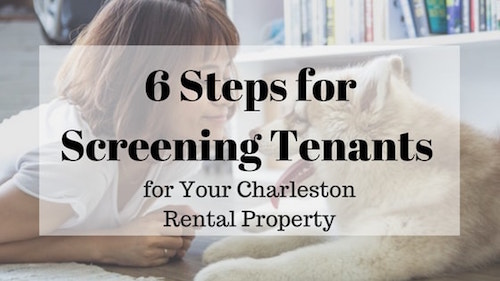
There is no way around it: if you want to find a great Charleston tenant, a great screening process is a must-have. A great screening process will help weed out the bad tenants from the good ones.
Ideally, a good-quality tenant is one who has the ability to easily obtain renter references from previous landlords, has solid employment and rental history, and has a good credit score.
In addition to this, a good renter treats you and your other renters with respect, pays rent on time, and is reliable in terms of taking care of your property and keeping it safe.
A good tenant screening process will increase your chances of landing a tenant with the aforementioned traits.
A Step-by-Step Guide on Screening Tenants for Your Charleston Rental Property:
1. Pre-Screen Tenants with the Right Questions
The screening process should begin as soon as you have generated interest in your property. By asking the right questions you will save both you and your applicant’s precious time.
The following are the basic screening questions that you should ask prospective tenants:
- “Do you have any pets?”
It’s a deal breaker if a prospective renter has a pet and you have a “no pets” policy.
- “Have you ever been evicted?”
Although the renter might lie, it’s still worth asking.
- “Will you agree to a credit and background check?”
If a prospective tenant doesn’t authorize you to run these checks, it’s likely that they have something to hide.
- “Can you provide references from your former landlord and employer?”
A renter that has nothing to hide will not hesitate to give you these references.
- “How many people will be living in the apartment?”
The more people living in the apartment, the more wear and tear there will be in your Charleston rental property. Look for a maximum of two people per bedroom and make sure to follow the states occupancy rules.
- “Will you have the first month’s rent and security deposit available upon move-in?”
Only consider those who will have enough money to move in.
- “What is your monthly income?”
Only consider those that earn thrice the amount of the monthly rental fee.
- “Why are you moving?”
Consider a tenant moving for reasons such as wanting more room or changing rooms. Avoid those that are moving because of an eviction or those that are suing their landlords.
While there are many good questions that you may ask, there are also some questions that you must avoid asking as these can qualify as discriminative. The following are some examples of questions that you should not be asking a tenant for your Charleston rental property:
- Are you pregnant?
- Are you an alcoholic?
- In what country were you born?
- You have very dark skin, are you white or Hispanic?
2. Request a Rental Application
Request that each and every potential tenant fills out a rental application. This is because a rental application will help you collect and verify tenant information, including references and rental history.
The rental application forms should cover all crucial details about the prospective renter. Preferably, it should cover personal, employment, and financial information.
Make sure that the application plainly states that the potential tenant is giving you authorization for personal, employment, and financial checks. Also, the application should clearly state that a credit check, criminal history report, or background check will be ordered, if appropriate.

Items that your rental application should look for include:
- Personal references
These include names, length of acquaintance, and phone numbers.
- Lifestyle information
For example, the number of occupants, and number and size of pets.
- Contact information for previous landlords.
- Financial information such as bank accounts and credit cards.
- Current income level
Check if the prospective renter’s income level is sufficient to cover rent and living expenses.
- Current and previous employers
3. Run a Credit Check
The main goal of a credit check is to get a picture of the applicant’s financial health. Typically, a credit check in Charleston will go back seven to ten years.
The top two things that you need to check when reviewing a credit report are:
- Current debt
A prospective applicant who has multiple unpaid balances, large loans, or has their credit cards maxed out may struggle to keep up with rental payments.
- Credit history
Here, things to look out for include collection accounts, late payments, and bankruptcies.

4. Check Their Rental Background
If you want a detailed report of the tenant’s past, this is the check to run. For a small fee, you can get investigative services from companies such as ScreeningWorks and StarPoint.
A background check will provide you with various public records, credit history, criminal history, and an eviction history.
Generally, you’ll need the tenant’s social security number to order a background check.
When you request a background check, consider the following:
- Public Records
If the prospective renter has been sued in the past or has been involved in a legal battle, it’ll show up in a background check. Beware of an application who has serious financial matter like unpaid child support, or one that was sued for unpaid rent.
- Criminal Records
Here, be on the lookout for a renter that has a serious or lengthy criminal record.
- Evictions
Check if the prospective tenant has an eviction history. If there is, get more details about it. Sometimes, even good people can fall on hard times.
5. Contact the Previous Landlords
Contacting the previous landlord can provide you with more details about the potential tenant.
Ask the previous landlord the following questions:
- Would you want to re-rent your apartment to this tenant again?
- How much security deposit did you return to the renter?
- Did the renter have any problems with neighbors?
- Did the tenant cause any excessive property damage?
- Does the tenant have a history of late payments?
- Does the renter owe you any outstanding debt?

6. Verify the Tenant’s Employment Details
Last but not the least, contact the tenant’s employer. Of course, you want a tenant that has an income that is steady and reliable.
There are two ways to verify the prospective renter’s income. You can either contact the employer directly, or you can ask the renter to give you a copy of their recent paystub.
A proper tenant screening process should be non-negotiable for every Charleston landlord. If you find the process overwhelming, consider hiring an experienced Charleston property manager.

No Comment